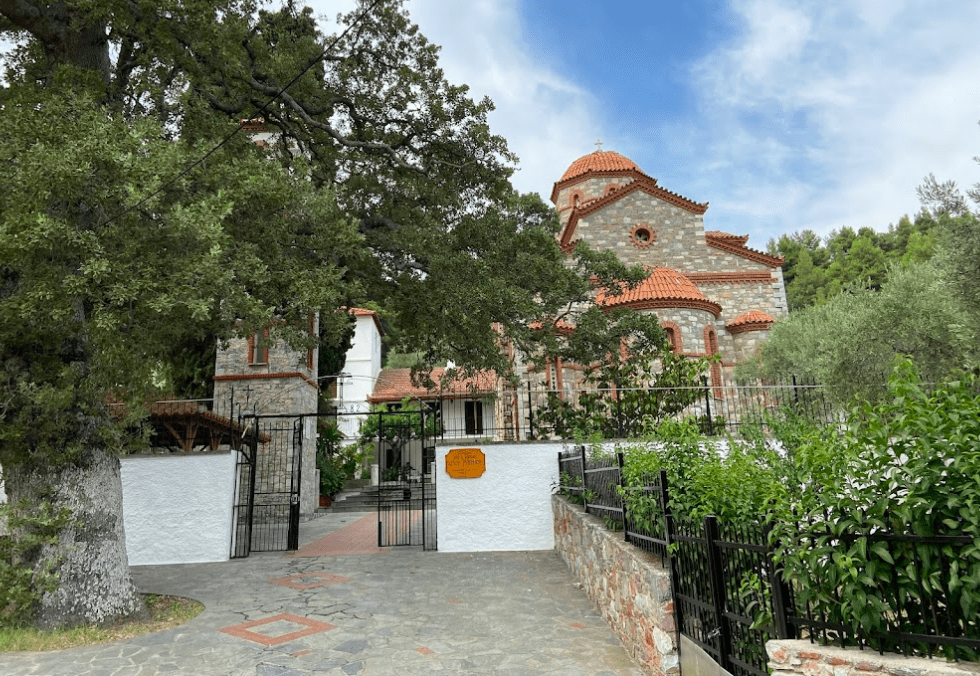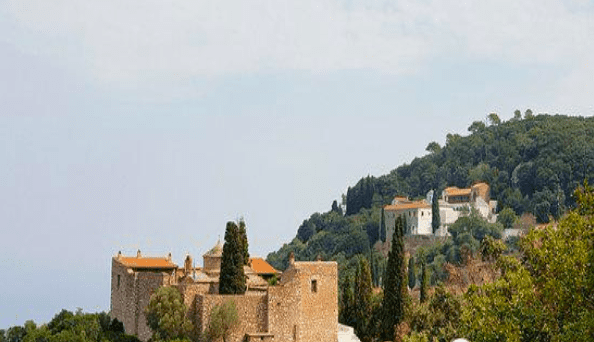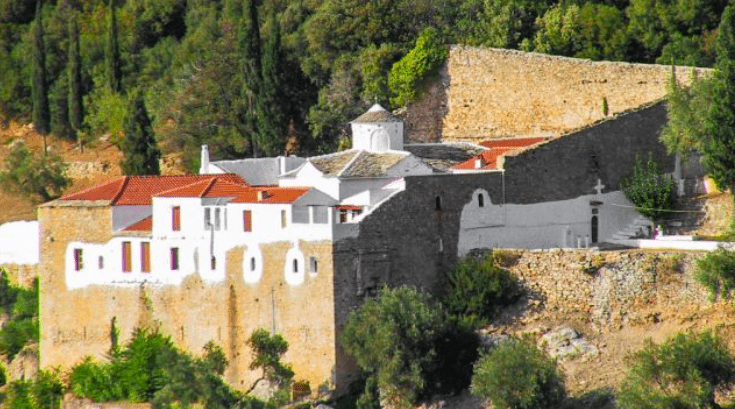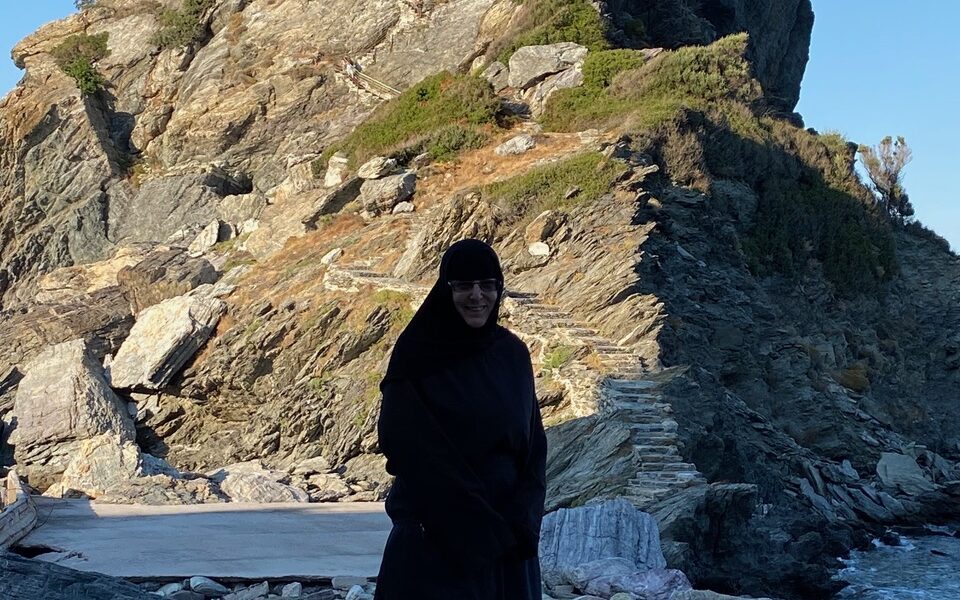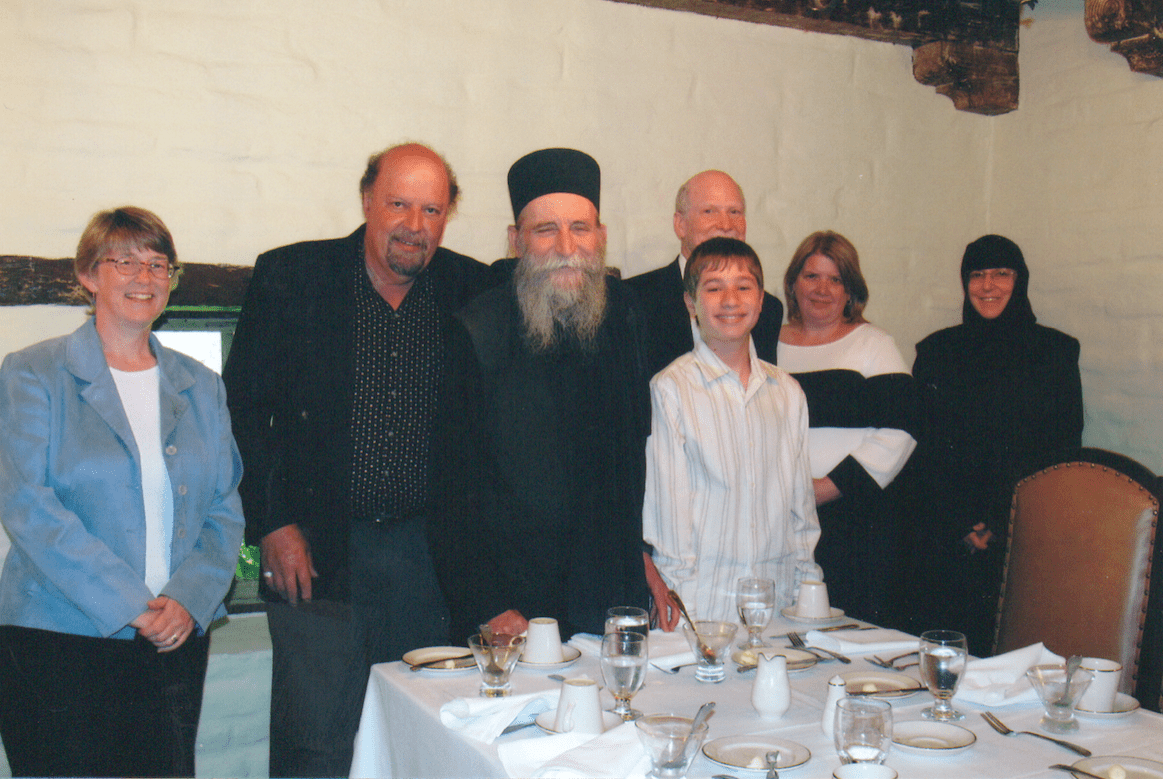Sister Ioanna is a Greek Orthodox nun serving on a monastery in Skopelos. She is half-Greek and half-Jewish-American. She feels a sense of belonging in Greece, much more so than in the United States. Greek City Times spoke to Sister Ioanna recently to learn more about her holy journey.
Describe your early life
I was born in New York, N.Y. My early childhood was like that of many, I imagine, however while enjoying the blessed embrace of kind and loving parents, I always felt that something was missing.
How Orthodox did you feel growing up?
My only idea of Orthodoxy as a child was that the services lasted too long! An impression gained on the rare occasion that we took my yia yia to church - having no idea of what was taking place there! My father’s innate interest in spirituality was also obstructed by the masonic symbols then unfortunately in place above the iconostasis (fortunately since removed) of the local parish. Our culture was the American one: “Be good people” — as though that were remotely possible without Christ as one's centre. (By the grace of God in His Saints, both of my parents left this life as faithful Orthodox Christians in the loving embrace of the Church.)
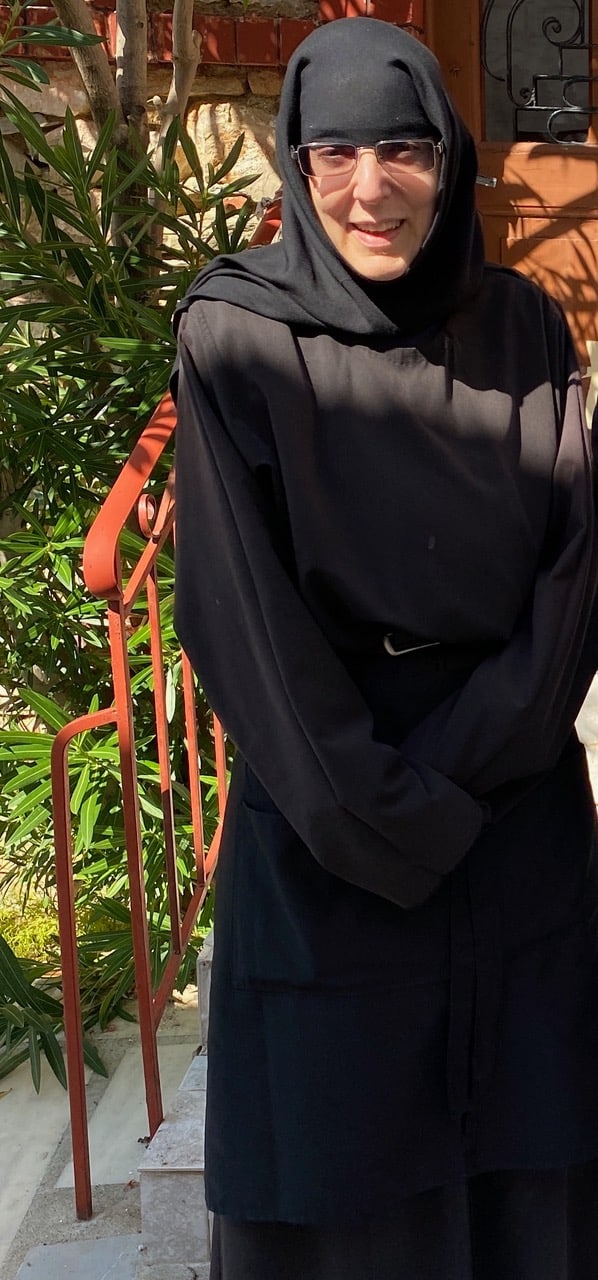
How Greek did you feel growing up?
I was in something like the fifth grade before I realised I was only half Greek! So much did my mum’s Greek family and zest for life rule our existence!
Narrate a pivotal choice or event that was instrumental to your early life and your calling into the religious life.
In the heyday of the drive-in theatre, my mom would dress us three kids in our pj’s and off we’d go for an evening with mom and dad at the movies. One night the movie was "King of Kings". I’ve never seen it since but this was where I learned about Christ. It was pivotal.
What informed your intention to enter the church?
The void I mentioned before. Enjoying all the material blessings, together with the realisation that they bring no inner happiness.
How did you wind up in Greece?
Well, one day when I was already out of college and working, my wonderful father said he would like to take me to the two lands of my heritage - Greece and Israel, as he was Jewish by birth. I was thrilled, as by now I was Orthodox and longing to walk in the earthly footsteps of Christ.
We visited Mr. Zaharias, the high school math teacher whose Greek philotimo had played such an influential role in awakening me to the riches of Orthodoxy. He recommended a wonderful travel itinerary starting in Corfu and then driving down to my mother's patrida in the Peloponnisso through Ioannina, gorgeous Metsovo, and then unearthly Meteora - where my life changed.
This is where I visited a women’s monastery for the first time … Not speaking much Greek, I forced my poor mom to ask the nuns when they would have Divine Liturgy, which happened to be the next morning. (With the insight of the Greek mother, or perhaps most mothers, she had a pretty clear idea of where my secret interests were leading.)
Very early the next morning, enveloped by the soft breezes of pink dawn swirling about Meteora’s rocky pillars, as I waited for the Monastery door to open . . . shall we say, I realised what my mom had already figured out.
At this time, there was almost no Orthodox monastic presence in the US. But I would have come to Greece for monasticism anyway, in order to be rest assured that I was receiving the most authentic monastic training. I didn’t want to be wondering the whole time if I was being taught correctly.
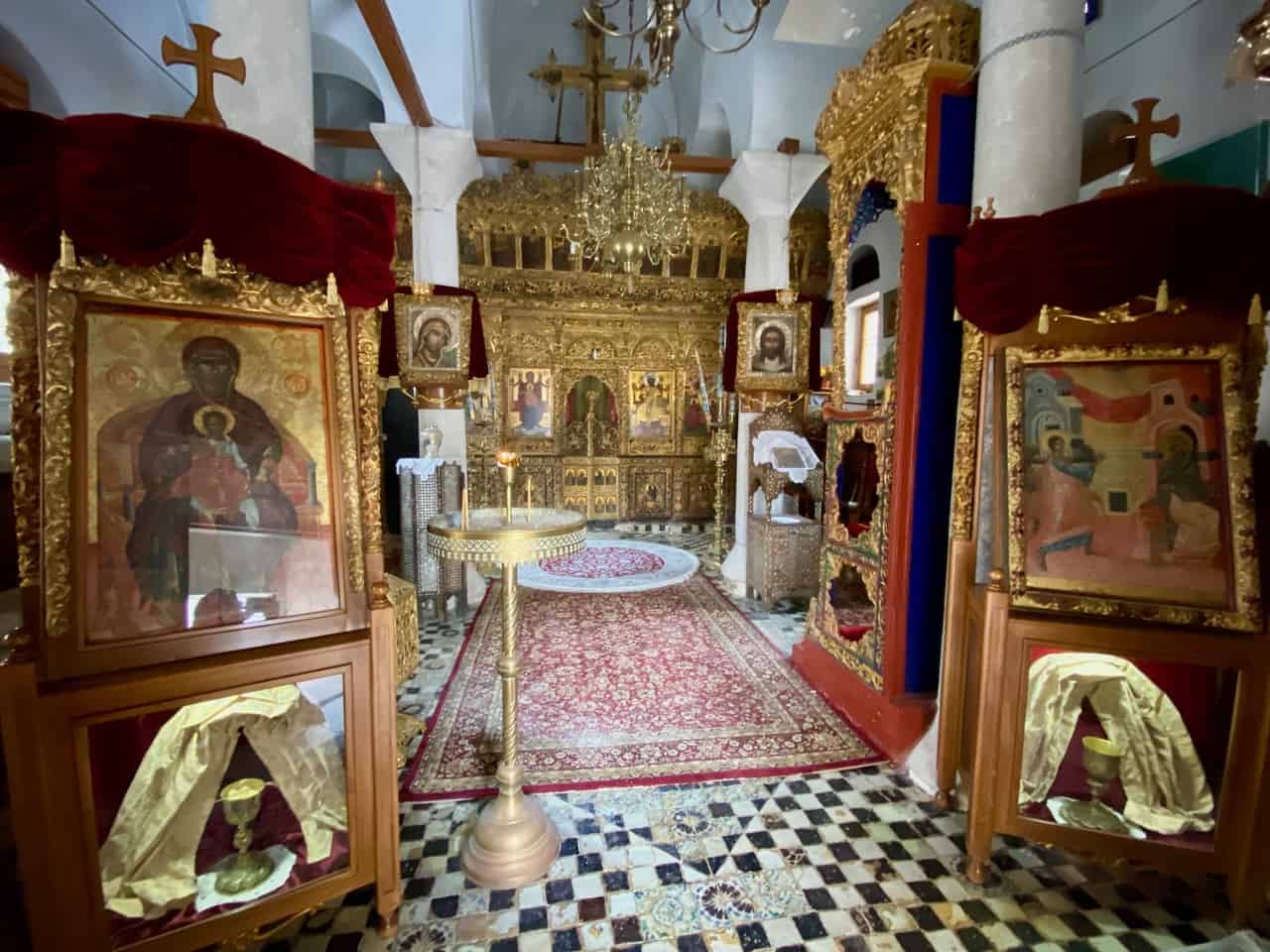
How do you reconcile the paradoxes of feeling both American and Greek?
I think, by trying to live up to the best qualities of each. Americans are the best people; they will help you and support your best intentions; they are sincere and direct; they have ideals and try to live up to them.
Greeks, on the other hand, are the best people. They will help and support your ideals but perhaps on both sides of the equation: While an American is less likely to offer assistance out of his reach, the enthusiastic support of a Greek knows no bounds! So much so that words are often equated with action!
But I said “on both sides of the question” because many Greeks will go further out on the limb for you than anyone - and follow through.
In my experience, these are Greeks who love the Church with all their heart and soul. No self-sacrifice is too much, no assistance too difficult. If you want to experience this, just be hosted by such a family in their home and watch them refill your plate during dinner with whatever you liked best before you noticed you wanted more.
There is a sensitivity, an insight and perceptivity that for me defines true nobility: the Greek philotimo. Lacking such sensitivity myself, I never questioned why an entire family I once stayed with for some weeks never ate meat. Only after the fact did I learn this was because they would not eat meat in front of me that my monastic diet did not allow.
More accurately, as I think back, when I actually did wonder about their meatless diet, I had supposed this must be a throwback to the era one hears about when Greeks had meat only on Christmas, Pascha, and at weddings — never considering the fact that this family raised and butchered beef for a living!!
What differences do you see among the faithful in America vs Greece, if any?
The biggest difference I’ve noted is the love with which the Greek faithful honour Christ - in action, not words - by living Orthodox life without compromise. This shows up most obviously during the holy fasting periods. The ease with which American Orthodox dishonour the fasts upon every excuse — a funeral, a Philoptochos “Christmas” luncheon, Sunday coffee hour, the thoroughly Protestant “Thanksgiving” — these are all inconceivable denials of the faith to the conscientious Orthodox Christian of Holy Greece.
This person understands that “thanksgiving” in Christian history and tradition consists of the Divine Liturgy, of the “the Divim” meaning “Divine Thanksgiving”. This is a liturgical event, the liturgical event which alone can thank God for His innumerable gifts culminated by His ineffable sacrifice for mankind on the Cross ... the fulfillment of the entire Old and New Testaments. Quite a far cry from a day devoted to nothing but glutting the stomach - during the Holy Nativity Fast - and calling it “thanksgiving to God”!
How interesting that the Feast of Saint Catherine who sacrificed all for Christ - youth, beauty, wealth, earthly glory - falls on or near this day of apostasy in the West, as though to show we have no excuse. Perhaps this, above her great learning, makes Saint Catherine the patron saint of education!
How telling, then, that the feast of Saint Catherine - the most honoured female Saint after the Holy Theotokos - is often ignored in favour of the protestant observance, Adam and Eve brought destruction upon all creation for nothing else: dishonouring the fast ordained by God.
In short, the feasts - and fasts - of the Orthodox faith have no other source but Holy Scripture and Liturgy. This is life itself for the faithful in Greece - for whom fasting in preparation for Holy Communion on the Feasts is our holy sacrifice to God, and thus true thanksgiving.
On more than one occasion I was astonished to find Greek faithful refuse to relax the fast even when staggered by grief at the sudden loss of a beloved son, or only sibling.
More could be said, but all could be summarised simply by noting the lack in American parishes of what is treasured by spiritually-minded Greeks as κατάνυξη - contrition. This is an inner state, the consciousness of one’s lack of sincere response to the boundless love of Christ for His creation.
This is reflected exteriorly in monasteries by the low light of services lit only by a few candles, with the readings and lyrical melodies of Byzantine hymns chanted in quiet tones that fill the soul even when you don’t understand a word of the liturgical Greek. Whereas an American will tell you he cannot “enjoy” the services unless he “understands" the words.. Who understands the mind of God? And does an Orthodox Christian go to church to receive - or to give? Of course he receives - but by giving! The contrition of his heart! I think this little detail is quite overlooked in many or most American parishes. The gift of holy contrition is the soul's understanding, beyond words, of the mystery of divine love - its secret union with Christ.

Why is it important to stay true to the Orthodox faith?
Because there is no life outside the Orthodox faith. “Let the dead bury their own dead” said our Christ.
How do you see the church keeping up with the changes in society (or not?)
The Church is always in sync with the changes in society because its truths are universal and timeless. The human condition never changes. From the fall of Adam until today our health, happiness, and success are compromised only by the destructive passions - our love for everything and everybody more than God. As the passions are healed only through the Mysteries of the Church — what is there to "keep up" with?
What are the greatest threats to continuing faith in both Greece and for diaspora Greeks?
Our love for material pleasures. Keeping in mind that the Fathers of the Church teach that material pleasure - and its resultant pain - did not even exist until the fall of humankind. Is this not the root of the suicidal self-assurance that closes our eyes and ears to the Truth, so that seeing we never perceive, and hearing we never understand, "lest we return” — not only to be forgiven by Christ, but to become vessels of His grace to all our loved ones?
Where do you belong? Why?
Hoping for what is possible only by the mercy of Christ, through the prayers of His Most Pure Mother and all the Saints, I belong in the kingdom of heaven. Because I am a creation of our Christ, for whose sins He was born and swaddled in a manger in His burial clothes, and for whom He rose from the dead to conquer death by death.
